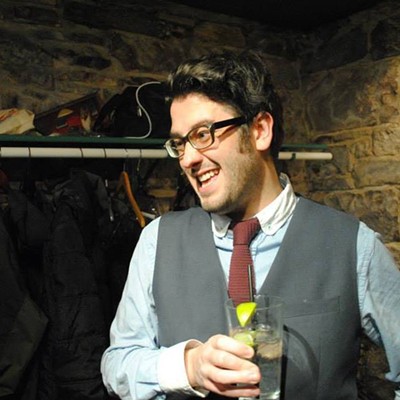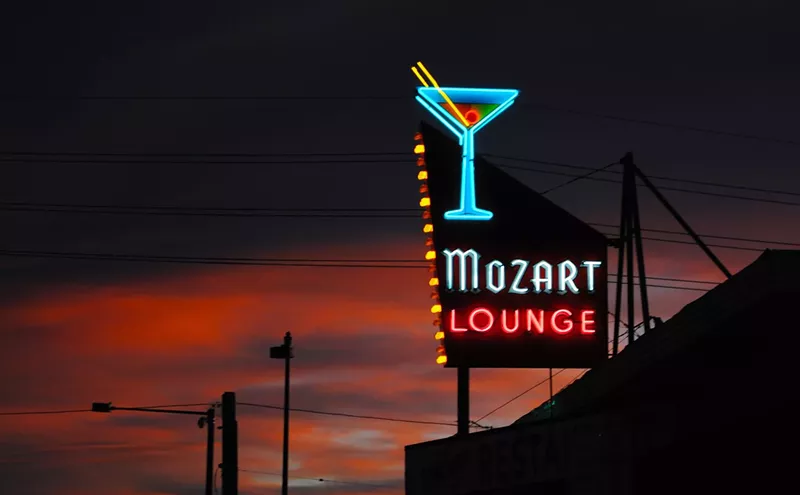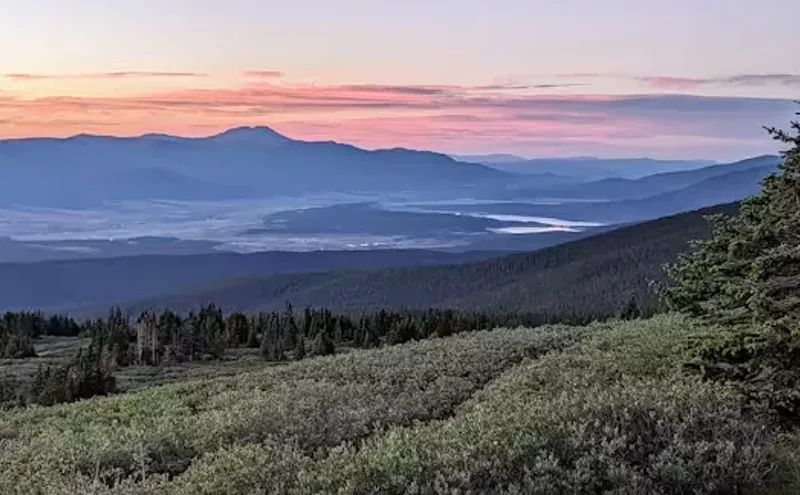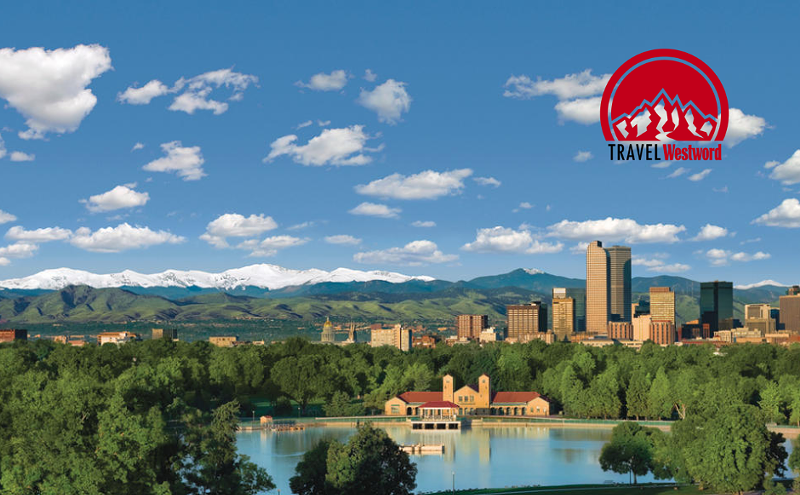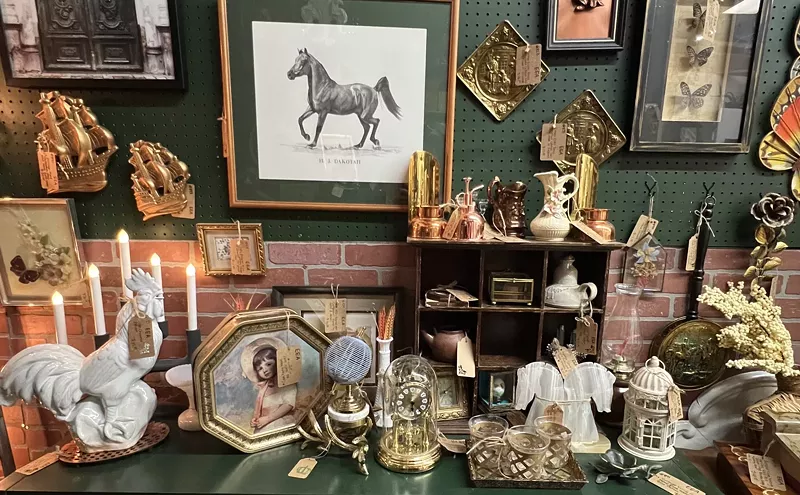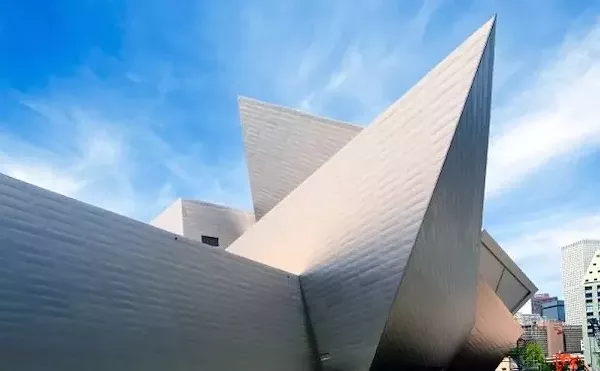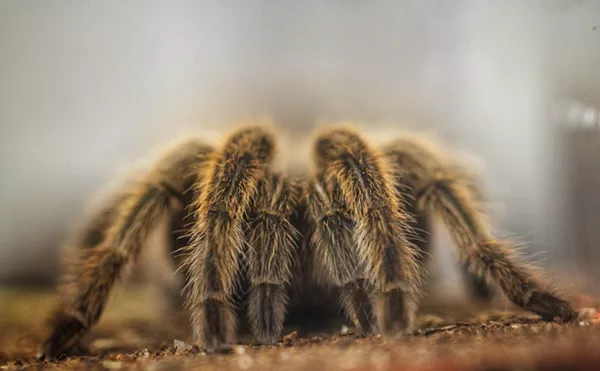He may be one of the world's highest-grossing comedians, but chances are that only loyal fans and regular Comedians in Cars Getting Coffee viewers are aware of Sebastian Maniscalco.
A magnetic stage presence and master of observational comedy that achieves the perfect balance of specific and relatable, Maniscalco has appeared on The Tonight Show with Jay Leno and Jimmy Fallon, Conan, and The Late Show With Stephen Colbert, and recorded four one-hour standup specials, including 2018's Stay Hungry. In addition to earning record-breaking box-office sales, Maniscalco's ascendant career includes performances in the Oscar-winning Green Book as well as Martin Scorsese's forthcoming prestige-contender The Irishman. It's becoming increasingly likely that Maniscalco's rise is just beginning.
Westword caught up with the hardworking comic to discuss the pressures of portraying a real-life mobster, how his dad feels about being the subject of so many jokes, and how he has persisted at standup after bombing at his first big show.
Westword: How would you describe this new hour that you're touring with. Is it new stuff, old stuff, stuff from the special, or all of the above?
Sebastian Maniscalco: I'd say the majority of it is new, but I pepper in some older stuff. Right now, I'm primarily talking about the family life experience, like with my wife and my kid. There are big differences between the ways my wife and I were brought up, and we're figuring out how those differences will affect what we teach our daughter. That conflict is always good for comedy. The rest is just everyday-type stuff. I mean, I say everyday-type stuff, but a couple Sundays ago I went to the Oscars and fell down some stairs.
That's not everyday stuff.
Yeah, but I'm taking the audience on a ride through my life. Even with the Oscar stuff, I keep it very relatable and very family-oriented.
Why did you choose to call both your memoir and latest special Stay Hungry? Is there any overlap between the book and the movie?
Well, the book is where the title "Stay Hungry" came from. And it's basically about not resting on your past successes, wanting to excel and do more. The more successful you get, I believe, the harder you gotta work to maintain that success. The book covers the peaks and valleys I went through over the past twenty years of my career while giving you some insight into how I grew up. And subsequently, I did the Stay Hungry special and tour after the book because I kinda wanted to stay on brand. The show doesn't necessarily have anything to do with staying hungry; it's a name we just kinda transferred over to the tour.
You’ve got a role in the upcoming Martin Scorsese movie The Irishman. How did that casting come about?
So they gave me a choice about whether I wanted to fly out to New York and audition before the casting director or put something on tape here in L.A. and send it to them. I decided that I wanted to go in front of the casting director personally, so I flew myself out there, put myself up in a hotel, and went to do the audition. And afterward, I didn't think I gave 100 percent. I thought I wasn't performing well, and the casting director told my agent, "You know, he's good, but he isn't consistent." Which I kinda knew, But then she said that if I wanted to take her notes and do something on tape, we'd be happy to show that tape to Martin Scorsese — "if he does a better job." So, long story short, I do it, she loves it and shows it to Scorsese, and I end up getting cast in a different role than I auditioned for. So again, I guess that's another example of staying hungry and not letting your ego get the best of you. So I was happy to get a second chance to show ’em what I got. And hats off to the casting director Ellen Lewis for believing in me.
I read somewhere that you’re playing the infamous mobster “Crazy Joe” Gallo in the film. Is that right?
Yeah.
Does portraying a real person require extra research or add any pressure to the performance, as far as honoring the legacy of a living —no, not living, he died — but a person who actually existed and has a family?
Yeah, you want to try and be accurate in how you portray the character. In this particular instance, there wasn't much information about Gallo on the Internet in regard to video, where I could kinda see how he behaved and spoke. The only videos I ran across were him testifying at the McLellan Commission. That's the only real video I had on him. But I did talk to some people who knew him and what have you. So, yeah, there is a little added pressure to get the nuances of the character right, but also put your own kind of twist on it. I don't know. I haven't seen the movie at all; I haven't even seen anything I shot. So I'm as curious as you are to see what this movie looks like.
Oh, I'm very curious. Aren't they digitally de-aging Robert DeNiro? Did he have those weird motion-capture dots all over his face when you were shooting?
I didn't see any dots. I don't know how the technology works in regard to de-aging someone, but I believe that it might be taking them a while to do that. I shot the movie at the end of 2017, so, yeah, that's probably what they're doing.
On stage, you’re uncommonly expressive and animated. Do you have to dial that back for an on-camera performance?
Yeah, I'm very physical and expressive with my standup, but in movies you gotta be a lot more subtle. Big body movements that work on stage typically don't translate to the big screen. You're performing in a box, really. So the muscle that you use for standup comedy is not necessarily the one you'd use for acting. So it was a big transition for me to dial it way, way back while still maintaining that intensity, you know?
Do you think you need to bring that intensity — because you play really big stages; like, your audiences are the size of a small town — do you feel like it's necessary to have a certain level of energy to reach that many people at once?
You know, I was in Pittsburgh a couple weekends ago, and the energy in the room was so alive. I mean, you really feed off what the audience is giving you. You can come out there with as much energy as you can, but if that energy is not reciprocated by the audience, it's hard to maintain that level. But, man, when it's given back, it's an exchange. It's really hard to describe the feeling; but when you and the audience are on this wave that you're riding together, it's really special.
So, you’ve made the Forbes list of the world’s highest -paid comedians two years in a row. Is it weird at all to have the general public be aware of your earning power?
It's a little strange. I come from a family who's very private about money, or what you've made. I grew up with a mother and father who told me to never tell anyone what your salary is. It's private information; plus you don't want to brag or boast about those kinds of things. It's not like I put out the Forbes magazine; they go and they do research, and they put it out. I'm not reading it like, "Hold on! I should be on there!" So it's a little strange, but I guess it's part of the business.
Speaking of your family, how does your dad feel about being the subject of so many jokes?
My dad is really, really enjoying what I'm doing, and he's taking part in it. I went to Chicago to do a book signing when the book came out, and I brought him. And then a line formed, and I was gonna do a signing for all the people who came and bought books. So somebody comes up in line, and I open their book, and there's another signature there. And I'm like, "What is this?" and they tell me, "Oh, your dad is signing books on the other end of the store." He started up his own signing booth! So, yeah, he's really enjoying it. And he was there for my shows at Madison Square Garden, along with my mother, my sister, and my wife and daughter. It's nice to share these moments with the ones you love.
Unlike a lot of other big headliners, your fan base comes from standup fans, and touring, and specials, rather than, you know, being on a sitcom and starring in movies. How did you build your audience, and how do you think you keep them coming back?
The way I did it was that I basically went out to the comedy clubs, and after each show, I would stand out in the lobby to take photos and sell my DVDs. And I kinda developed a personal relationship with people while subsequently having specials air on Showtime and Netflix. So that all helped me to garner large groups of people who really enjoy standup in general, but enjoy it even more when it's related to their own lives. I find that a lot of the people keep coming to my show are often reiterating, like, "Oh, man, it's like you grew up in our neighborhood or our house." So I think that sense of nostalgia is something people are yearning for in this crazy world we're living in. Like, I talk about how it used to be to have company come over, and that became a viral bit that multiple generations related to.
The "doorbell" bit?
Yeah, people really seemed to enjoy the doorbell. I also keep 'em coming back with fresh material; I never want to come into a market like Denver and have people say, "We saw that last time," or "We saw that on TV." I'm always writing, and always trying to make the set relatable, current and fresh. So hopefully, when people come back, it's a new show.
I read somewhere that you got booed off the stage the first time you ever did standup. Where did that happen, and how did you find the will to keep going after such a rough start?
Well, I went to Northern Illinois University, in DeKalb, Illinois, and I tried out for a competition to open up for a comedian who was coming to the school. And I won the competition, but when I opened up for the comedian, it was a primarily African-American crowd; and if you've done comedy long enough, you know they really tell you how they feel. If they don't like you, they don't like you, and they're not gonna be polite about it. And so they booed. And it was an eye-opening experience for me. However strange this might sound, something about everybody booing made me know that I was meant to be performer, that I was at home. I just needed a lot of practice.
I mean, if you want to keep doing it after an experience like that, it's probably what you're meant to do.
Yeah, once you get booed, something must be working.
Is there anything else you want to mention — projects on the horizon, or plugs of any kind?
Well, I'm in Green Book, the movie that won the Oscar.
That's definitely going in the intro.
But to have back-to-back movies with Green Book and The Irishman has really been a blessing for me. For a guy who doesn't get into acting so much to be in those kinds of movies, come on! It's not like I'm out here doing horror flicks. These are prestige movies.
Way better than being the first guy to get stabbed.
[Laughs.] Yeah. And I also got a show called the The Pete and Sebastian Show that airs every Friday on Sirius XM and then gets released as a podcast. It's a behind-the-scenes look at the personal, professional and private lives of me and Pete Correale. We've been doing it for five years, and we have over 300 episodes. Check us out.
Sebastian Maniscalco, 7 and 9:30 p.m. March 22, and 5 and 8 p.m. March 24, Paramount Theatre, 1621 Glenarm Place, $39.75 to $59.75 via Altitude Tickets.

Audio By Carbonatix
[
{
"name": "GPT - Billboard - Slot Inline - Content - Labeled - No Desktop",
"component": "23668565",
"insertPoint": "2",
"requiredCountToDisplay": "2"
},{
"name": "STN Player - Float - Mobile Only ",
"component": "23853568",
"insertPoint": "2",
"requiredCountToDisplay": "2"
},{
"name": "Editor Picks",
"component": "17242653",
"insertPoint": "4",
"requiredCountToDisplay": "1"
},{
"name": "Inline Links",
"component": "18838239",
"insertPoint": "8th",
"startingPoint": 8,
"requiredCountToDisplay": "7",
"maxInsertions": 25
},{
"name": "GPT - 2x Rectangles Desktop, Tower on Mobile - Labeled",
"component": "24956856",
"insertPoint": "8th",
"startingPoint": 8,
"requiredCountToDisplay": "7",
"maxInsertions": 25
},{
"name": "Inline Links",
"component": "18838239",
"insertPoint": "8th",
"startingPoint": 12,
"requiredCountToDisplay": "11",
"maxInsertions": 25
},{
"name": "GPT - Leaderboard to Tower - Slot Auto-select - Labeled",
"component": "17676724",
"insertPoint": "8th",
"startingPoint": 12,
"requiredCountToDisplay": "11",
"maxInsertions": 25
}
]


